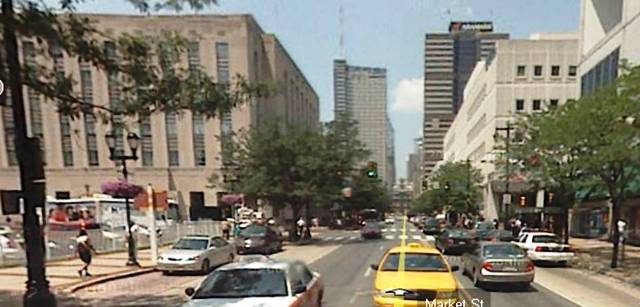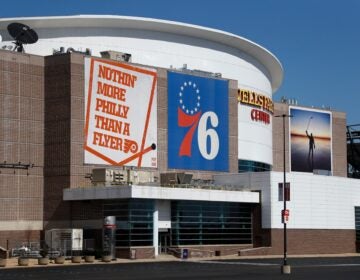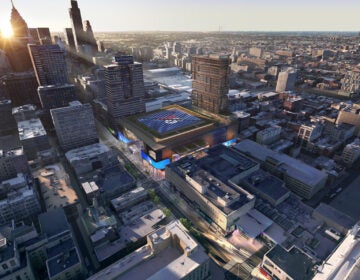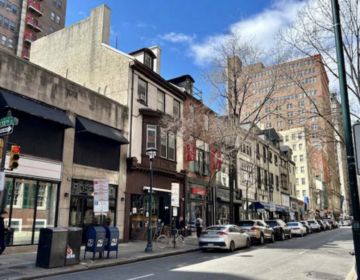How Foxwoods is playing out

Dec. 06
By Thomas J. Walsh
For PlanPhilly
It’s December, and that means the proposed Foxwoods casino would open a year from now in a space within The Gallery at 11th and Market streets, according to the time line given by developers.
But despite preliminary approvals for zoning changes that were recently green-lighted by City Council and a general approval in concept from the Philadelphia City Planning Commission, what the slots parlor will look like is still a mystery. It will remain that way for at least a month or more.
Things are in motion, though, says Terry Gillen, senior economic advisor to Mayor Michael Nutter and the head of the city’s Redevelopment Authority. Gillen and others are evaluating companies that have made bids to work on the redevelopment of The Gallery in particular and the surrounding Market East corridor in general.
Requests-for-proposals were sent out Nov. 14 by the Philadelphia Industrial Development Corp. (PIDC), seeking casino and retail architects, real estate and economic advisers, strategic planners and traffic study consultants for the “Convention Center/Market Street East area of Center City.”
“Right now, everybody is sort of focused on the whole viability of the project, and I just don’t know where they’re at right now,” said Peter Longstreth, PIDC’s president. “It was a pretty robust response.”
“We’re in the process of looking at the responses, and we’ll probably invite people in during the next couple of weeks,” Gillen said. At least 20 responses were received from all over the country, perhaps owing in part to the slow economy. “We hope to select teams by the end of December.”
The early work will include a traffic study to specify requirements for The Gallery, which will likely be a much less complicated issue than it was for the Columbus Boulevard location. Part of the charm in the Gallery location, the thinking goes, is that it sits atop a main regional rail hub, with access from bus and subway routes, and is walking distance from Convention Center hotels, tourist destinations and Center City neighborhoods.
Gillen said another team selected through the RFP process would get to work in January on crunching numbers to determine the economic impact of the casino.
Who’s who
Meanwhile, Casino-Free Philadelphia, a group that has been strongly voicing its opinions on the city’s two proposed gaming halls, is undertaking a city planning effort of its own aimed at the Market East commercial district. The study will be announced in January, organizers say.
Veronica Polo, a city planner who most recently worked for the nonprofit Save Our Waterfront in Camden, said Casino-Free decided to do their own study “just to answer some of the hard questions that aren’t being asked elsewhere for political reasons.”
Anti-casino groups are annoyed by a lack of information about how the casino might look and how it would impact the area surrounding The Gallery. (Graphic renderings of the project will not be available in the next few weeks, Gillen said, because Foxwoods and PREIT are still negotiating terms of the deal.) That frustration was kicked up a notch when the RFPs were issued, as it seemed to some that the city was proceeding apace without further public input. Additionally, those not familiar with city’s normal commercial real estate and development procedures wondered why it was PIDC, and not Foxwoods, that was seeking bids.
PIDC is a private, not-for-profit corporation, created in 1957 by the Greater Philadelphia Chamber of Commerce and the Commerce Department to promote economic development within the city. Despite, and perhaps because of its private status, it is the city’s official economic development agency. Veterans of the agency explain the role as one of trust between public officials and executives at firms where privacy in their business dealings is vital.
Through federal, state and local sources, PIDC offers subordinated and below-market rate financing to encourage investment in the city. The loans can cover infrastructure, land acquisition and construction, and are usually leveraged by the developers’ private debt and equity. According to its 2007 annual review (essentially a marketing tool, it is not akin to publicly traded companies’ annual reports), PIDC settled 64 loans last year with about $105 million. (http://www.pidc-pa.org/PIDC2007AnnualReview.pdf)
Bright vs. blight
The case for a Foxwoods-ignited redevelopment of Market East is that a casino would help hotels in the area with increased occupancy and higher accompanying room rates. It could also encourage the building of more hotels (or retail, or residences) to the east, bridging the gap between the historic area and the Pennsylvania Convention Center. Though most of Center City’s hotel rooms built during the past decade came from converted high-rises, The Gallery had always been zoned for the possibility of a hotel above it. (The RDA owns those air rights.)
“That was part of what we thought made it appealing,” Gillen said. “It could stimulate new development. That’s the positive potential.”
“I understand that argument,” said Polo, who lives in South Philadelphia. “The state of Pennsylvania certainly seems to feel that way, But I don’t know what kind of possibilities would come from a slot barn. That is not a high-end quality venue. The Market East site, for me and a lot of other people, represents the heart of the city, and in a way this decision represents the values of Philadelphia – what it means to put a casino in a such a sensitive area.”
There are also two prime blocks on East Market Street’s south side – between 8th and 9th, and between 11th and 12th – where developers could start from scratch on hotels or major new retail. Those parcels are classic underperformers, with a string of disappointing development possibilities consistently going by the boards in past years.
“The ability to introduce a casino to provide support for your ratable tax base, in a very compact environment, is very good,” said Anthony Graziano Jr., associate managing director for Integra Realty Resources in Toms River, N.J., specializing in the Atlantic City real estate market.
“But that’s not the only equation in revitalization. Every one of these casino deals is extremely complex – there are often billions of dollars spent to get them developed.”
Whether you like casinos or not, the Commonwealth has been enriched this year by hundreds of millions of dollars in tax relief, garnered from the steep 50 percent tax on casinos. And no matter your opinion, the sooner Philadelphia’s casinos open, the sooner the city will reap its own wage tax benefits, said Paul Levy, president of the Central Philadelphia Development Corp. and the Center City District, during his organization’s monthly membership meeting earlier this week.
“Market East has long lacked the shopping, dining and entertainment venues that create a lively, continuous link between the historic area and the Convention Center complex,” wrote Levy, in his Fall newsletter. “Similarly, Market East has yet to engage the burgeoning downtown residential population, 40 percent of whom walk to work.
“City government thus has a special obligation not to focus obsessively on the casino and its opponents, or to revert to its customary, project-specific focus. It’s time to look at Market East as whole, taking this unique opportunity to transform the entire area into a pedestrian-friendly, high-energy, shopping, dining and entertainment district.”
Polo said she’s putting out a sort of informal RFP of her own, seeking architects, planners, economists and real estate people to contact Casino-Free Philadelphia about the alternative Market East planning study she wishes to complete.
PREIT-Rubin
Those opposed to the Foxwoods plan are increasingly curious about the dual roles of the developer and the operator of The Gallery, PREIT, one of the oldest publicly traded real estate investment trusts in the country. Formed in 1960, PREIT merged with The Rubin Organization in 1997, and has been run since then by chairman and CEO Ron Rubin.
The Rubin name appears on a Pennsylvania Gaming Control Board list of Foxwoods Philadelphia’s owners, as the Rubin Family Charitable Foundation. Officials say the foundation will funnel casino proceeds to charities for children.
The Foxwoods ownership structure
Rubin is recognized as one of the most successful and politically connected business names in the region. He has been a longtime major backer of Gov. Ed Rendell, whose Philadelphia office is located in The Bellevue building on South Broad Street – also PREIT’s headquarters. Also listed as a Foxwoods owner, with what appears to be a very small stake, is George Rubin, vice chairman of PREIT.
“People are talking about it, and there are definitely conflicts of interest, and it’s very disturbing,” Polo said.
PREIT has a 99-year lease on the stores within The Gallery, but the RDA owns the site itself and the mall’s common areas.
“Ron is not an investor [in the casino],” said Maureen Garrity, spokeswoman for Foxwoods and Rubin. “He started the charity in his name, but he himself is not an investor.”
Garrity said Rubin does not grant interviews. Rubin is said to have removed himself from all negotiations between PREIT and Foxwoods.
“You can also take comfort” in that relationship, said Graziano. “In some ways, PREIT might help by having those interests already aligned, and being able to bring the operation to fruition faster.”
What’s next
“We have to start the planning, and a lot of developers right now are hoping that credit starts getting easier in the first quarter of 2009,” Gillen said. She said the first sign of a break in the credit markets might have come Thursday, when the Federal Reserve’s “Beige Book” indicated that acquiring long-term commercial debt is not quite as bad in Philadelphia as it is on a national level.
That said, Gillen said she could not even begin to speculate on what the project’s overall cost would be, let alone a specific amount that would need financing. And though Foxwoods officials have stated December 2009 as a target date for ribbon-cutting, Gillen has her doubts that that was ever a realistic time frame.
More immediately, Gillen’s staff at the RDA is working with the Planning Commission and the office of Councilman Frank DiCicco to determine the next set of guidelines for the first few months of 2009.
“We’ll probably have a better sense of that in a week or so,” she said.
Contact the reporter at thomaswalsh1@gmail.com.
ON THE WEB
PREIT: http://www.preit.com/
CPDC/CCD Fall newsletter: http://www.centercityphila.org/docs/CCDigest-Fall08-Web.pdf
Casino-Free Philadelphia: http://www.casinofreephila.org/
RDA: http://www.phila.gov/rda/
PIDC: http://www.pidc-pa.org/
WHYY is your source for fact-based, in-depth journalism and information. As a nonprofit organization, we rely on financial support from readers like you. Please give today.






